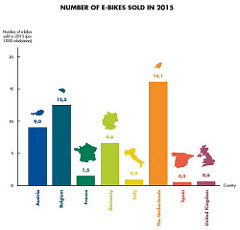
ECF launches a new report calling for more balanced e-mobility strategies to realise potential of e-cycling

Today ECF launched a new report called Electromobility for all: fiscal Incentives for e-cycling. ‘Despite their obvious advantages and cost-effectiveness, e-bikes are still kept out from e-mobility policies. Therefore, we seek to draw the attention of decision-makers at all levels to the potential they offer. We provide key policy recommendations and best practice examples, with the goal of promoting e-cycling throughout Europe’ – commented Holger Haubold, author of the report and ECF Fiscal and Economic Policy Officer.
Earlier this month, the French government had announced a € 200 financial assistance for the purchase of a pedal-assisted electric bike following after successful advocacy action of French ECF member FUB and other interest groups. France followed the positive example of Austria which, thanks to various local fiscal incentive programmes, has developed one of the biggest e-bike markets in Europe. In 2015, 9 e-bikes per 1000 inhabitants were sold in the Alpine country (compared to 6.6 in Germany or 1.5 in France).
 Both France and Austria have taken these initiatives for a simple reason: investment in e-cycling pays off. In addition to the economic, environmental, health and other benefits that cycling has to offer, e-bikes are the perfect solution for longer distance trips. In studies, they proved to be faster than cars in trips up to 10 km (twice longer than the ones with conventional bikes). Moreover, they make it easier to overcome natural obstacles (like hills or headwinds), thus they are suitable for commuters wanting to arrive at work in their professional attire, less physically trained cyclists, elderly people and other groups that did not cycle before. Besides, e-bikes make it possible to transport heavier goods, thus providing a great solution for individual shoppers and companies relying on fast urban logistics. Therefore, e-bikes are seen as a potential alternative to cars, especially for trips in urban areas.
Both France and Austria have taken these initiatives for a simple reason: investment in e-cycling pays off. In addition to the economic, environmental, health and other benefits that cycling has to offer, e-bikes are the perfect solution for longer distance trips. In studies, they proved to be faster than cars in trips up to 10 km (twice longer than the ones with conventional bikes). Moreover, they make it easier to overcome natural obstacles (like hills or headwinds), thus they are suitable for commuters wanting to arrive at work in their professional attire, less physically trained cyclists, elderly people and other groups that did not cycle before. Besides, e-bikes make it possible to transport heavier goods, thus providing a great solution for individual shoppers and companies relying on fast urban logistics. Therefore, e-bikes are seen as a potential alternative to cars, especially for trips in urban areas.

In order to keep up with EU CO2 emission commitments, and to reap even more benefits of cycling, decision makers at all levels are encouraged to include e-cycling in their electromobility strategies, and to provide relevant funding mechanisms. The ECF report shows that despite tremendous support for electric cars (1.4 billion euros spent in Germany until 2014!), the payback is rather low (only 25 500 electric cars are rolling on German streets), meanwhile with little investment it is possible to reach a massive surge of electric bikes!
You can find a more detailed overview of incentive schemes in some of EU Member states, benefits of e-bikes and fiscal policy recommendations in the ECF report published online. In addition, further policy recommendations for European decision makers concerning electromobility policy will follow with the adoption of the European Cycling Strategy blueprint document.
Find a new report here. Look for the pictures and graphs here.
News category:
Contact the author
Recent news!
Upcoming events
Contact Us
Avenue des Arts, 7-8
Postal address: Rue de la Charité, 22
1210 Brussels, Belgium









